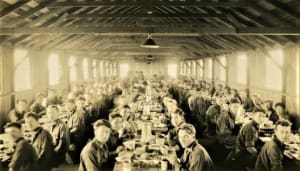The 90th Anniversary of the Civilian Conservation Corps: Its History & Legacy in Massachusetts
Thursday, Sep 07, 2023 6:00p -
7:00p
Where:
Boston Public Library
Central Library in Copley Square
Boston, MA 02117
Admission:
FREE
Categories:
Good for Groups, History, Lectures & Conferences, Nature
Event website:
https://bpl.bibliocommons.com/events/6491d14765b521b504b87b26
Join Marty Podskoch to hear about the 90th Anniversary of the founding of the Civilian Conservation Corps (CCC). The CCC began on April 5, 1933 when President Roosevelt signed the Emergency Conservation Act that was part of the “New Deal” to relieve the poverty and unemployment of the Depression. FDR brought together two unused resources, the young men and the land. He promised he’d have 250,000 men in camps by the end of July 1933. It targeted single men, 18-25 years old, and WWI veterans in relief of families who had difficulty finding jobs during the Great Depression. Enrollees were paid a dollar a day. Twenty-five dollars was sent home to their parents and the young men had five dollars spending money.
The program provided unskilled manual labor in environmental conservation and the development of natural resources in rural lands. CCC camps were located in all of the 48 states and these territories: Alaska, Hawaii, Puerto Rico and the US Virgin Islands — St. Thomas, St. John, and St. Croix. Roosevelt chose the Army to supervise the camps which consisted of approx. 200 men each. The Army moved thousands of enrollees from induction centers to working camps in record time. It used its own regular and reserve officers, together with regulars of the Coast Guard, Marine Corps, and Navy to temporarily command camps and companies. Enrollees received good food, uniforms, shelter, and medical care. During the summer of 1933 they lived in tents; later they moved into wooden buildings.
There were 51 CCC camps in these Massachusetts towns, state parks, and forests: Andover, Harold Parker SF; Ashburnham SF; Brewster @ Roland C. Nickerson SP ;Brimfield SF, Charlemont @ Mohawk Trail SF (2 camps SP-6 & S-87), Chester SF, Chicopee Memorial SP; Douglas SF; Easthampton-Holyoke @ Mt. Tom Res.; East Otis @Tolland SF; Erving SF; Foxborough SF; Franklin SF; Freetown @ Fall River SF; Goshen @ D. A. R. SF; Granville SF; Hawley @ Kenneth Dubuque Memorial SF; Heath @ H. O. Cook SF; Leominster SF; Edgartown @ Manuel E. Cornellus SF; Monroe SF; Monterey @ Beartown SF (2 camps S-66 & SA-66); Mount Greylock (2 camps SP-8 Pittsfield & SP-70); Mount Washington @ Bash Bish Falls SP; N. Spencer @ Spencer SF; Oakham, SF; Otis SF; Petersham SF; Peru SF; Pittsfield SF; Plymouth @ Miles Standish SF; Sandisfield SF; Sandwich @ Shawme-Crowell SF; Savoy Mt. SF (4 camps SP-21, SA-70, S-87, S-94); Spencer SF (S-55); Sutton SF; Townsend SF; Upton SF; Warwick SF (2 camps S-86 & S-92); Washington-Lenox-Becket-Lee @ October Mt. SF (2 camps S-52 & SA-520); Wendell SF; Willard Brook SF(S-61); Winchendon @ Otter River SP; and Windsor SF.
In Massachusetts the main work was in tree planting, firefighting, and tree and plant disease and insect control, although several recreational facilities were also built in the forests and parks. Enrollment in Massachusetts exceeded 99,500 men. An average of 28 camps a year were operated with a total financial obligation within the state of more than $45,100,000. The CCC disbanded in 1942 due to desertions, increased employment opportunities, changes in public opinion, lack of funding, and the need for soldiers to serve in World War II.
The CCC program is considered by many to be one of the most successful of Roosevelt’s New Deal programs. Roosevelt’s “Tree Army” planted more than 3,000,000,000 trees on land made barren from fires, natural erosion, intensive agriculture or logging. In fact, the CCC was responsible for over half the reforestation, public and private, in the nation’s history. Enrollees constructed trails and shelters in more than 800 parks nationwide. The CCC helped to shape the modern national and state park systems we enjoy today. CCC companies contributed to an impressive number of state and national park structures that visitors can still enjoy. The CCC developed 94 national park sites including national parks, monuments, recreation areas and historic sites, and created 741 state parks.
The Civilian Conservation Corps Legacy is a national organization that is “Dedicated to research, preservation, and education of future generations to create a better understanding of the CCC and its continuing contribution to American life and culture." Anyone interested in learning about the work of the CCC Legacy and joining should visit www.ccclegacy.org or facebook.com/groups/ccclegacygroup.

Martin Podskoch is an author, historian and East Hampton, CT resident recognized for his extensive work documenting the history of the Catskills, Adirondack Fire Towers, and the Civilian Conservation Corps camps. His first travel guide, “The Adirondack 102 Club: Your Passport & Guide to the North Country” has become the best-selling travel guide book in the Adirondacks.
-

SponsoredDay Trip from Boston: Kayak Castle Neck River at Crane Estate
Saturday, Jul 05, 2025 11:30a
Crane Beach
-

SponsoredWatch 4 Local Singles Go On A Blind Date at "It's A Date" - Boston's Hottest Comedy Dating Show
Monday, Jun 30, 2025 7:30p
Aeronaut Brewing

